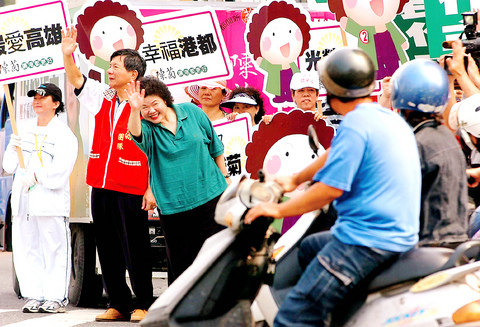Democratic Progressive Party (DPP) Chairman Yu Shyi-kun yesterday strongly recommended using approval ratings to select the party's Kaohsiung mayoral candidate, sparking anger from some party members, who accused him of failing to remain impartial.
Although former Council of Labor Affairs chairwoman Chen Chu (
Under the DPP's current primary mechanism, party members will vote on Sunday for their favored candidate. This will count for 30 percent in the selection process. A telephone survey of Kaohsiung residents -- scheduled for next month -- will count for the remaining 70 percent.

PHOTO: CHANG CHUNG-YI, TAIPEI TIMES
Yu said at a press conference that he had consulted some "important people" in the party about the new method and had gained their support.
"We would like to emphasize that only unity can lead to a victory and only negotiation could result in unity," Yu said. "We think that using a survey to settle on a candidate is the best way to find out the best hope for the DPP."
Yu added that the Taipei and Kaohsiung mayoral elections were crucial to the DPP's development and he was worried about the negative effect if the DPP failed to win the elections.
Therefore, Yu said, the DPP would try its best to coordinate with the three potential candidates -- DPP Legislator Kuan Bi-ling (
"I believe that if each candidate moves backward a small step, this would help the whole party move forward a big step," Yu said.
But the New Tide faction, the largest of the DPP's factions and the one Chen Chu belongs to, responded negatively.
Former chief convener of the party's New Tide faction Tuan Yi-kang (段宜康) yesterday afternoon held a news conference to question the identities of the "important people" Yu had mentioned. Tuan asked Yu to release their names, to prevent the Kaohsiung nomination from becoming the result of "secret chamber politics."
"Yu should be the judge in this game, but instead he has jumped into the game and tried to intervene in the outcome, which we think is not impartial at all," Tuan said.
Tuan urged the DPP to stick to its primary mechanism.
"If the DPP abandons its primary regulations, then I think it has lost a precious part of what it has earned," Tuan said.
Some other members of the DPP said that Yu was biased in favor of Yeh.
"I think the whole thing is because some people lack a democratic attitude," DPP Legislator Huang Wei-cher (
When asked about her reactions, Chen yesterday said that one of the reasons former DPP legislator Luo Wen-jia (
"Without a complete primary, Luo later had significant difficulties in winning recognition from local voters on the campaign trail, and the method was seen to have enraged the DPP's grassroots members," Chen Chu said.

‘DENIAL DEFENSE’: The US would increase its military presence with uncrewed ships, and submarines, while boosting defense in the Indo-Pacific, a Pete Hegseth memo said The US is reorienting its military strategy to focus primarily on deterring a potential Chinese invasion of Taiwan, a memo signed by US Secretary of Defense Pete Hegseth showed. The memo also called on Taiwan to increase its defense spending. The document, known as the “Interim National Defense Strategic Guidance,” was distributed this month and detailed the national defense plans of US President Donald Trump’s administration, an article in the Washington Post said on Saturday. It outlines how the US can prepare for a potential war with China and defend itself from threats in the “near abroad,” including Greenland and the Panama

The Chinese Nationalist Party (KMT) is maintaining close ties with Beijing, the Democratic Progressive Party (DPP) said yesterday, hours after a new round of Chinese military drills in the Taiwan Strait began. Political parties in a democracy have a responsibility to be loyal to the nation and defend its sovereignty, DPP spokesman Justin Wu (吳崢) told a news conference in Taipei. His comments came hours after Beijing announced via Chinese state media that the Chinese People’s Liberation Army’s Eastern Theater Command was holding large-scale drills simulating a multi-pronged attack on Taiwan. Contrary to the KMT’s claims that it is staunchly anti-communist, KMT Deputy

RESPONSE: The government would investigate incidents of Taiwanese entertainers in China promoting CCP propaganda online in contravention of the law, the source said Taiwanese entertainers living in China who are found to have contravened cross-strait regulations or collaborated with the Chinese Communist Party (CCP) could be subject to fines, a source said on Sunday. Several Taiwanese entertainers have posted on the social media platform Sina Weibo saying that Taiwan “must be returned” to China, and sharing news articles from Chinese state media. In response, the Mainland Affairs Council (MAC) has asked the Ministry of Culture to investigate whether the entertainers had contravened any laws, and asked for them to be questioned upon their return to Taiwan, an official familiar with the matter said. To curb repeated

Myanmar has turned down an offer of assistance from Taiwanese search-and-rescue teams after a magnitude 7.7 earthquake struck the nation on Friday last week, saying other international aid is sufficient, the National Fire Agency said yesterday. More than 1,700 have been killed and 3,400 injured in the quake that struck near the central Myanmar city of Mandalay early on Friday afternoon, followed minutes later by a magnitude 6.7 aftershock. Worldwide, 13 international search-and-rescue teams have been deployed, with another 13 teams mobilizing, the agency said. Taiwan’s search-and-rescue teams were on standby, but have since been told to stand down, as